- Home
- Ian Mcewan
Sweet Tooth Page 4
Sweet Tooth Read online
Page 4
‘What trick?’
I quickly turned over the recent past. Since there was no trick, I was suddenly hopeful that there was a simple matter we could straighten out in seconds. We could be laughing about this, I even thought. We could be making love before noon.
We reached the point where the lay-by joined the road. ‘Get this clear,’ he said, and we stopped. ‘You’ll never get between Frieda and me.’
‘Tony, what trick?’
He turned back again in the direction of his car and I followed. ‘Bloody nightmare.’ He was talking to himself.
I called out over the din. ‘Tony. Tell me!’
‘Aren’t you pleased? Last night we had our worst row in twenty-five years. Aren’t you excited by your success?’
Even I, inexperienced and baffled and horrified as I was, could sense the absurdity of this. He was going to tell me in his own way, so I said nothing and waited. We walked back past his car and the closed-up kiosk. To our right was a hedge of high dusty hawthorns. Gaily coloured sweet wrappers and crisp packets were trapped in the spiky branches. There was a used condom, ridiculously long, lying on the grass. A fine place to end an affair.
‘Serena, how could you be so stupid?’
I did feel stupid. We stopped again and I said in a quavering voice I couldn’t control, ‘I honestly don’t understand.’
‘You wanted her to find your blouse. Well, she found your blouse. You thought she’d be furious and you were right. You thought you could break up my marriage and move in but you were wrong.’
The injustice of this overwhelmed me and it was hard to speak. Somewhere just behind and above the root of my tongue my throat was beginning to tighten. In case there were tears I turned away quickly. I didn’t want him to see.
‘Of course, you’re young and all that. But you should be ashamed.’
When I found it, I hated my croaky pleading voice. ‘Tony, you said to put it in your laundry basket.’
‘Come on now. You know I said nothing of the sort.’
He said it gently, almost lovingly, like a caring father, one I was about to lose. We should have been having a row, bigger than any he’d ever had with Frieda, I should have been flying at him. But inconveniently I thought I was about to start crying and I was determined not to. I don’t cry easily, and when I do I want to be alone. But that soft plummy voice of authority pierced me. It was so confident and kind that I was close to believing it. I already sensed I could never alter his recollection of the previous Sunday or prevent him from dismissing me. I also knew I was in danger of behaving as though I was guilty. Like a shoplifter, crying with relief at being caught. So unfair, so hopeless. I couldn’t speak to make my case. Those hours of waiting by the phone and the sleepless night had undone me. The back of my throat went on tightening, other muscles lower down my neck joined in, tugging at my lips, trying to stretch them over my teeth. Something was going to snap, but I couldn’t let it, not in front of him. Not when he was so wrong. The only way to hold it down and keep my dignity was to remain silent. To speak would have been to let go. And I was desperate to speak. I needed to tell him how unjust he was being, how he was risking everything between us for a lapse in memory. It was one of those familiar occasions when the mind wants one thing, the body another. Like wanting sex during an exam, or being sick at a wedding. The more I struggled in silence to stay on top of my feelings, the more I hated myself and the calmer he became.
‘It was underhand, Serena. I thought you were better than that. I don’t find this easy to say, but I’m deeply disappointed.’
He went on in this way while I remained with my back turned. How he had trusted me, encouraged me, had high hopes for me, and I had let him down. It must have been easier for him, talking to the back of my head, not having to look me in the eye. I was beginning to suspect that this was not about a simple mistake, a commonplace failure of memory in a busy, important older man. I thought I saw it all plainly enough. Frieda had come back early from Vienna. For some reason, perhaps a nasty hunch, she had gone out to the cottage. Or they had gone there together. In the bedroom was my laundered blouse. Then came the scene in Suffolk or London, and her ultimatum – get rid of the girl, or march. So Tony had made the obvious decision. But here’s the point. He had made another choice too. He had decided to cast himself as the victim, the wronged, the deceived, the rightly furious. He had persuaded himself that he had said nothing to me about the laundry basket. The memory had been erased, and for a purpose. But now he didn’t even know he’d erased it. He wasn’t even pretending. He actually believed in his disappointment. He really did think that I had done something devious and mean. He was protecting himself from the idea that he’d had a choice. Weak, self-deluding, pompous? All those, but above all, a failure of reasoning. High table, monographs, government commissions – meaningless. His reasoning had deserted him. As I saw it, Professor Canning was suffering from a gross intellectual malfunction.
I groped for a tissue in the tight pocket of my jeans and blew my nose with a sad honking sound. I still could not trust myself to speak.
Tony was saying, ‘You know where this all has to lead, don’t you?’
Still in his soft-voiced therapeutic mode. I nodded. I knew exactly. He told me anyway. As he did, I watched a van draw up at speed and stop with a clever drifting skid on the gravel by the kiosk. Pop music was playing loudly from the cabin. A young guy with a ponytail and drummer’s T-shirt that showed off his muscled brown arms got out and slung two big polythene bags of hamburger buns onto the dirt by the kiosk. Then he was gone with a roar and a cloud of blue smoke which the wind brought straight to us. Yes, I was being dumped, like the buns. I suddenly understood why we were here in this lay-by. Tony was expecting a scene. He didn’t want to have it in his tiny car. How would he eject a hysterical girl from the passenger seat? So why not have it here, where he could drive away and leave me to hitch a ride back into town?
Why should I tolerate that? I walked away from him towards his car. I knew what I had to do. We could both remain in the lay-by. Forced into my company for an extra hour, he might be brought to his senses. Or not. It didn’t matter. I had my plan. I reached the driver’s door, pulled it open and took the keys from the ignition. His whole life on a chunky ring, a big busy masculine array of Chubbs, Banhams and Yales, his office, his house, his second home, his mailbox, safe and second car, and all the other parts of his existence he had kept from me. I drew back my arm to throw the ensemble over the hawthorn hedge. If he could find a way in, let him go through the field on hands and knees among the cows and shit puddles and look for the keys to his life while I watched.
After three years of Newnham tennis my throw would have been reasonably strong. But I wasn’t able to show it off. My arm was at the limit of its backswing when I felt his fingers curl round my wrist and tighten. He had the keys off me in seconds. He wasn’t rough and I put up no struggle. He pushed round me and got into his car without speaking. He had said enough, and besides, I had just confirmed the worst of his expectations. He tossed my bag onto the ground, slammed the door and started the engine. Now that I had my voice back, what did I say? Again, I was pathetic. I didn’t want him to leave. I called stupidly through the car’s canvas top, ‘Tony, stop pretending that you don’t know the truth.’
How ridiculous. Of course he wasn’t pretending. That was precisely his failure. He gunned the engine a couple of times in case there was anything else I wanted to say that needed drowning out. Then he pulled forward – slowly at first, concerned perhaps that I would throw myself over the windscreen or under the wheels. But I stood there like a tragic fool and I watched him go. I saw his brake lights come on as he slowed to join the traffic. Then he was gone, and it was over.
3
I didn’t cancel my appointment with MI5. I had nothing else in my life now, and with Lucy’s affairs settled for the moment, even the Bishop was encouraging about my career prospects in Health and Social Security. Two days after the lay-
by scene I went to my interview in Great Marlborough Street, on the western edge of Soho. I waited on a hard chair set down for me by a mutely disapproving secretary in a dim corridor with a concrete floor. I don’t think I’d ever been in such a depressing building. Along from where I sat was a row of iron-framed windows formed out of the sort of bubbled glass bricks I associated with basements. But it was the dirt, inside and out, not the bricks, that deterred the light. On the window ledge nearest me were piles of newspapers covered in black grit. I wondered whether the job, if I was offered it, would turn out to be a form of sustained punishment administered at a distance by Tony. There was a complex odour drifting up a stairwell. I passed the time trying to identify its multiple sources. Perfume, cigarettes, ammonia-based cleaning fluid and something organic, perhaps once edible.
My first interview, with a brisk and friendly woman called Joan, consisted mostly of form-filling and answering simple biographical questions. An hour later I was back in the same room with Joan and an army type called Harry Tapp, who had a sandy toothbrush moustache and chain-smoked from a slim gold case. I took to his old-fashioned clipped voice, and the way he softly drummed the yellow fingers of his right hand whenever he spoke and rested them when he listened. In the course of fifty minutes the three of us colluded in the construction of a character profile for me. I was essentially a mathematician with other suitable interests. But how on earth had I ended up with a third? I lied or distorted as required and said that in my final year I had, quite foolishly, given my workload, become interested in writing, in the Soviet Union and in the work of Solzhenitsyn. Mr Tapp was intrigued to hear my views, which I recited, having read through my old pieces as advised by my departed lover. And beyond university, the self I invented was derived entirely from my summer with him. Who else did I have? Sometimes I was Tony. I had a passion, it turned out, for the English countryside, in particular Suffolk, and for one glorious ancient pollarded wood, where I liked to ramble and pick ceps in the autumn. Joan knew about ceps and while Tapp looked on impatiently, we quickly swapped recipes. She had never heard of pancetta. Tapp asked me if I had ever taken an interest in encryption. No, but I confessed a weakness for current affairs. We hurried through the issues of the day – the miners’ and dockers’ strikes, the Common Market, the mayhem in Belfast. I spoke the language of a Times leader, echoing patrician, thoughtful-sounding opinions that could hardly be opposed. For example, when we arrived at the ‘permissive society’ I cited The Times’s view that the sexual freedom of individuals had to be balanced against the needs of children for security and love. Who could take a stand against that? I was getting into my stride. Then there was my passion for English history. Again, Harry Tapp perked up. What in particular? The Glorious Revolution. Ah now, that was very interesting indeed! And then, later, who was my intellectual hero? I talked of Churchill, not as a politician, but as a historian (I summarised the ‘incomparable’ account of Trafalgar), as the Nobel Laureate for Literature, and then as the watercolourist. I’d always had a particular fondness for the little-known Marrakech Rooftop Laundry, which I believed was now in a private collection.
Prompted by something that Tapp said, I daubed onto my self-portrait a passion for chess without mentioning that I hadn’t played in more than three years. He asked me if I was familiar with the Zilber–Tal endgame of 1958. I wasn’t but I could plausibly elaborate on the famous Saavedra position. In fact, I had never in my life been so clever as during that interview. And not since my articles in ?Quis? had I been so pleased with myself. There was little I could not talk about. I could give my ignorance on any matter a certain shine. My voice was Tony’s. I spoke like a master of a college, the chairman of a government committee of inquiry, a country squire. Join MI5? I was ready to lead it. It was no surprise then, after I had been asked to leave the room and called back five minutes later, to hear Mr Tapp tell me he had decided to offer me a job. What else could he do?
For several seconds I didn’t take in what he was saying. And when I did, I thought he was teasing or testing me. I was to fill the post of junior assistant officer. I already knew that in Civil Service rankings this was the lowest of the low. My principal duties would be in filing, indexing and related library work. With hard work and in time, I might rise to assistant officer. I didn’t allow my expression to betray what I suddenly understood – that I’d made a terrible mistake, or Tony had. Or that this really was the punishment he had devised for me. I was not being recruited as an ‘officer’. Not a spy then, no frontline work. Pretending to be pleased, I enquired tentatively, and it was confirmed by Joan as a routine fact of life: men and women had separate career tracks and only men became officers. Of course, of course, I said. Of course I knew that. I was the clever young woman who knew everything. I was too proud to let them see how misinformed I had been or how put out I was. I heard myself accept with enthusiasm. Marvellous! Thank you! I was given a start date. Can’t wait! We stood and Mr Tapp shook my hand and drifted away. As Joan walked me down to the entrance, she explained that his offer was subject to the usual vetting procedures. If I was accepted, I would be working over in Curzon Street. I would be obliged to sign the Official Secrets Act and be bound by its strict provisions. Of course, I kept saying. Marvellous. Thank you.
I left the building in a disturbed and dark state of mind. Even before I said goodbye to Joan I’d decided I didn’t want the job. It was an insult, a lowly secretarial position at two-thirds the usual rate. With tips I could have earned double as a waitress. They could keep their job. I’d write them a note. However disappointing, that at least seemed clear. I felt emptied out, I had no idea what I was supposed to be doing or where I should go. My money was running out for my Cambridge room. No choice then but to go back to my parents, become a daughter again, a child, and face the Bishop’s indifference and my mother’s organising zeal. Worse though than that prospect was this sudden fit of lover’s grief. Impersonating Tony for an hour and raiding memories of our summer for my own use had brought the affair to life in my thoughts. I had talked myself into understanding the full measure of my loss. It was as though we’d been having a long conversation and he’d abruptly turned away, leaving me with an overpowering sense of his absence. I missed him and yearned for him, and knew I’d never get him back.
Desolate, I went slowly along Great Marlborough Street. The job and Tony were twin aspects of one thing, a summer’s sentimental education, and it had disintegrated around me in forty-eight hours. He was back with his wife and his college, and I had nothing. No love, no job. Only the chill of loneliness. And the sorrow was compounded by the memory of the way he’d turned on me. So unfair! I glanced across the road and by a nasty coincidence found myself approaching the mock Tudor facade of Liberty’s, where Tony had bought the blouse.
Trying not to feel crushed, I quickly turned down Carnaby Street and picked my way through the crowds. Whining guitar music and the scent of patchouli from a basement shop made me think of my sister and all the trouble at home. Ranks of ‘psychedelic’ shirts and Sergeant Pepper-ish tasselled military suits hung on long racks on the pavement. Available for like-minded hordes desperate to express their individuality. Well, my mood was sour. I went down Regent Street, then turned left, penetrating deeper into Soho, and walked along streets filthy with litter and abandoned snacks, ketchup-streaked burgers and hotdogs and cartons squelched into the pavement and gutter, and rubbish sacks heaped around lamp posts. The word ‘adult’ was everywhere in red neon. In windows, items on mock-velvet plinths, whips, dildoes, erotic ointments, a studded mask. A fat guy in a leather jacket, some kind of strip-joint barker, called out to me from a doorway a single indistinct word that sounded like Toy! Perhaps it was Oi! Someone whistled at me. I hurried on, careful to look no one in the eye. I was still thinking of Lucy. Unfair to associate this quarter with her, but the new spirit of liberation that had got my sister arrested and pregnant had also permitted these shops (and, I might have added, my own affair with an older man). Lucy h
ad told me more than once that the past was a burden, that it was time to tear everything down. A lot of people were thinking that way. A seedy, careless insurrection was in the air. But thanks to Tony I now knew with what trouble it had been assembled, Western civilisation, imperfect as it was. We suffered from faulty governance, our freedoms were incomplete. But in this part of the world our rulers no longer had absolute power, savagery was mostly a private affair. Whatever was under my feet in the streets of Soho, we had raised ourselves above filth. The cathedrals, the parliaments, the paintings, the courts of law, the libraries and the labs – far too precious to pull down.
Perhaps it was Cambridge and the cumulative effect of so many ancient buildings and lawns, of seeing how kind time was to stone, or perhaps I simply lacked youthful courage and was cautious and prim. But this inglorious revolution wasn’t for me. I didn’t want a sex shop in every town, I didn’t want my sister’s kind of life, I didn’t want history put to the torch. Come travelling? I wanted to travel with civilised men like Tony Canning, who took for granted the importance of laws and institutions and thought constantly of how to improve them. If only he wanted to travel with me. If only he wasn’t such a bastard.
The half-hour it took me to wander from Regent Street to the Charing Cross Road arranged my fate for me. I changed my mind, I decided to take the job after all and have order and purpose in my life and some independence. There may have been a passing touch of masochism in my decision – as a rejected lover I deserved no more than to be an office skivvy. And nothing else was on offer. I could leave behind Cambridge and its association with Tony, and I could lose myself in London’s crowds – there was something pleasingly tragic about that. I would tell my parents I had a proper Civil Service job in the Department of Health and Social Security. It turned out that I needn’t have been so secretive, but at the time it rather thrilled me to mislead them.

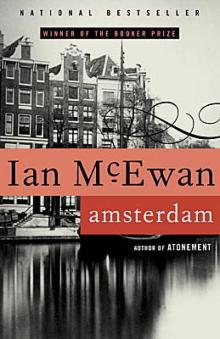 Amsterdam
Amsterdam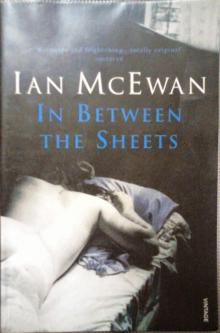 In Between the Sheets
In Between the Sheets Atonement
Atonement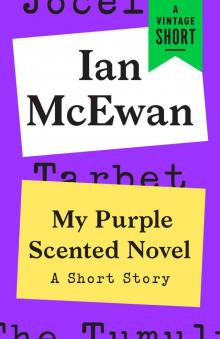 My Purple Scented Novel
My Purple Scented Novel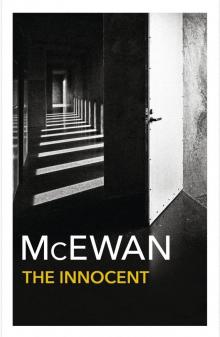 The Innocent
The Innocent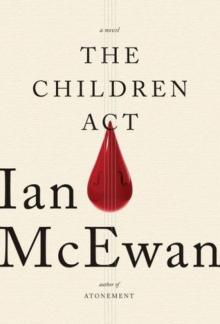 The Children Act
The Children Act Enduring Love
Enduring Love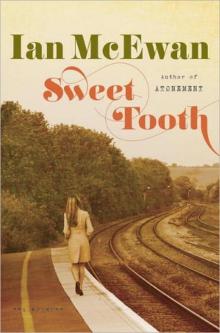 Sweet Tooth
Sweet Tooth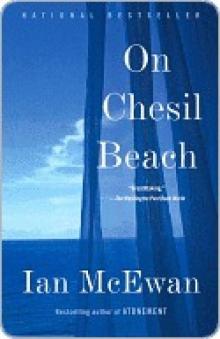 On Chesil Beach
On Chesil Beach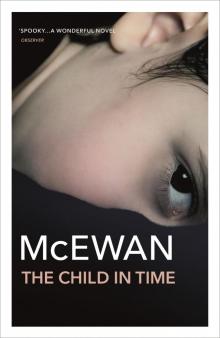 The Child in Time
The Child in Time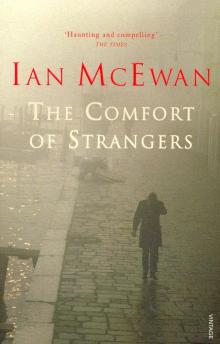 The Comfort of Strangers
The Comfort of Strangers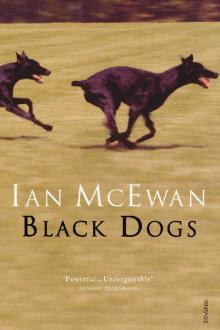 Black Dogs
Black Dogs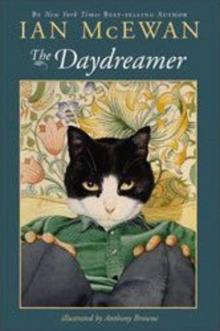 The Daydreamer
The Daydreamer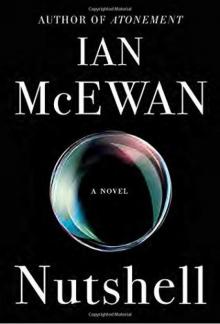 Nutshell
Nutshell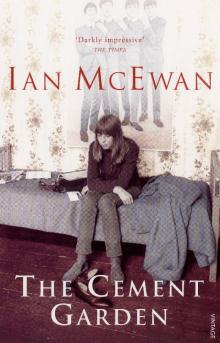 The Cement Garden
The Cement Garden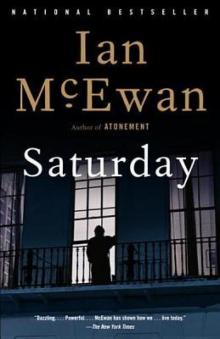 Saturday
Saturday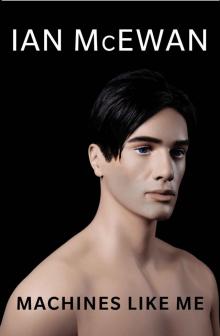 Machines Like Me
Machines Like Me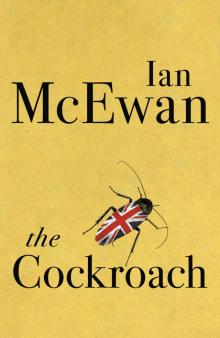 The Cockroach
The Cockroach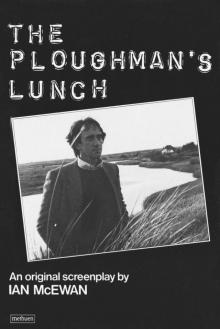 The Ploughman’s Lunch
The Ploughman’s Lunch